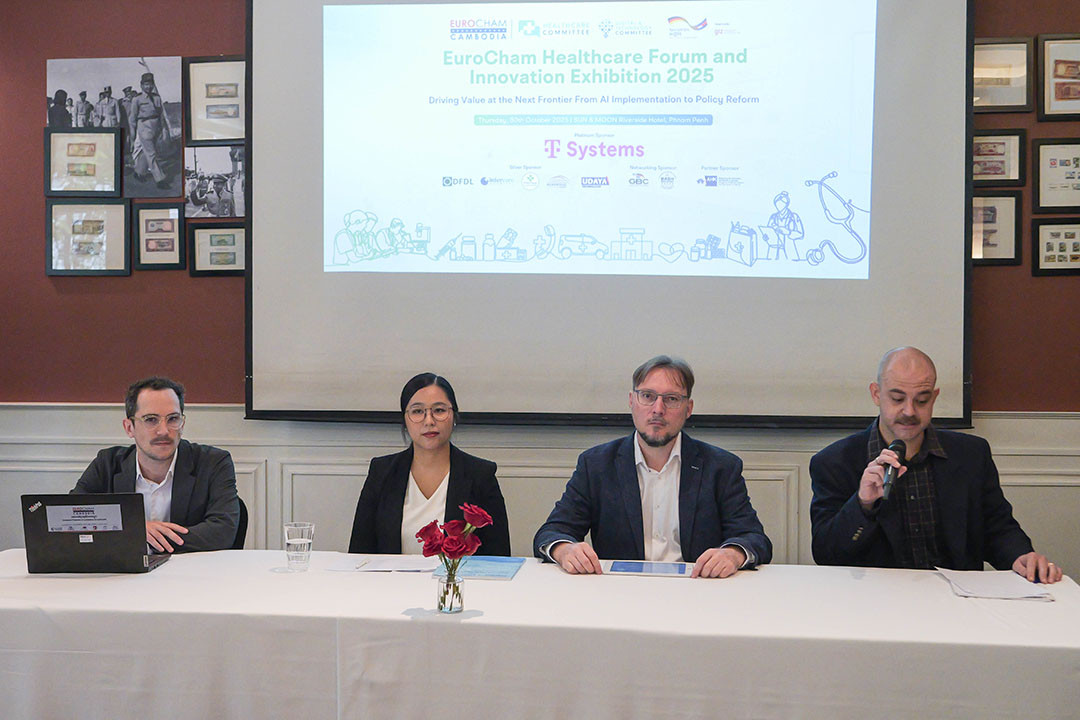EuroCham Healthcare Forum To Promote a Sustainable and Inclusive Digital Health System in Cambodia

The European Chamber of Commerce (EuroCham) in Cambodia hosted a press conference on October 28, 2025, at TOPAZ Norodom, ahead of the EuroCham Healthcare Forum & Innovation Exhibition 2025, to outline the forum’s objectives, strategic themes, and forthcoming policy proposals on digital health governance.
The forum is set to take place on October 30 at the SUN & MOON Riverside Hotel, with a focus on exploring opportunities to advance Cambodia’s digital health economy and promote a regulatory framework that supports a more sustainable and inclusive healthcare system overall.
Martin Brisson, Executive Director of EuroCham Cambodia, opened the conference by highlighting EuroCham’s mission, serving as the voice of European business in Cambodia by fostering dialogue, advocacy, and responsible private sector growth.
He underscored the critical role of the Healthcare Committee, established in 2015, to promote ethical business practices and support the development of a safe, transparent healthcare market in Cambodia. Over the past decade, the Committee has expanded its focus from pharmaceutical integrity and regulatory compliance to broader themes such as digital health innovation, telemedicine, and data protection frameworks.
Brisson also announced EuroCham’s upcoming 2025 White Paper on Digital Health Governance, which will offer policy recommendations for building secure, interoperable, and innovation-ready healthcare systems in Cambodia.
Cambodia’s Crossroads in Digital Health
Speaking on why EuroCham decided to emphasise digital health systems at this year’s healthcare forum, Dr. Elias Engelking, Co-Chairperson of the EuroCham Healthcare Committee, explained that Cambodia currently stands at a pivotal moment shaped by two global transitions converging locally.
“For the first shift, we see that development financing is changing, so traditional foreign aid is becoming smaller, and international partners are shifting from grants to investment,” he said. “As Cambodia moves towards upper-middle-income status, it must attract new partnerships that mix government leadership and private investment.”
“The second big shift is that the world is going through digital transformation. We all know platforms like Grab and PassApp have changed how we connect pay and receive services, and healthcare is now moving in the same direction,” added Dr. Engelking.
He emphasised public–private co-creation as a proven model for achieving digital health at scale, and cited the Credit Bureau of Cambodia (CBC)—though not within the healthcare sector—as a demonstrated example of how a trusted data-sharing infrastructure can be built successfully through such collaboration.
_20251028_145012.jpg)
Digital Health platforms can connect patients, hospitals, pharmacies, laboratories and insurers in one trusted system. When data flows safely, everyone benefits. Patients have better care, doctors work more efficiently, and investors see a system they can trust.
“The goal is to make digital health a new driver of growth, improving healthcare access, creating skilled jobs and attracting investment,” Dr. Engelking stressed.
He further outlined three key proposals to be discussed at the forum:
- National Digital Health Coordination Committee (NDHCC): To align ministries and private stakeholders under a unified governance framework.
- Cambodia Health Industry and Technology Alliance (CHITA): To foster coordinated private sector engagement and innovation.
- Shared Digital Infrastructure: To create secure, interoperable systems that connect patients, providers, and policymakers.
White Paper 2025: Governing Digital Health Platforms in Cambodia
The press conference also featured remarks from Sor Samnangvathana, Co-Chairperson representing Practitioners of the EuroCham Healthcare Committee, and Senior Consultant at DFDL, who introduced highlights of EuroCham’s forthcoming 2025 White Paper, titled “Governing Digital Health Platforms in Cambodia: Legal Insights and Policy Options.”
The White Paper identifies key regulatory gaps created by the rapid rise of Digital Health Platforms (DHPs), such as telemedicine and AI-assisted care, and proposes legal and institutional reforms to ensure safety, accountability, and equitable access.
"Digital health platforms are transforming how care is delivered, but regulations must evolve to keep pace. This White Paper aims to guide and provide recommendations to policymakers and investors in building a secure, trusted, and inclusive digital health ecosystem for Cambodia," Samnangvathana explained.
_20251028_145111.jpg)